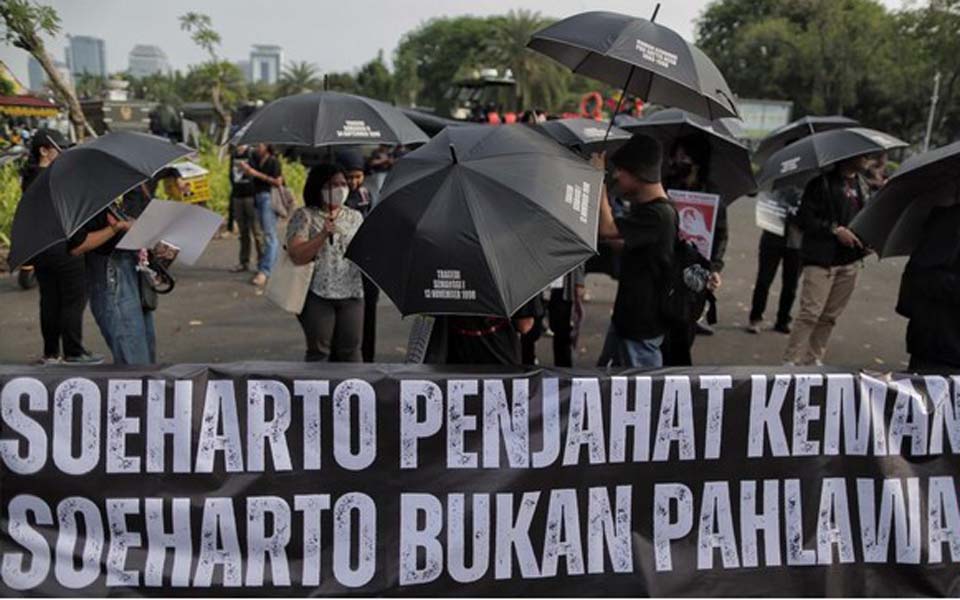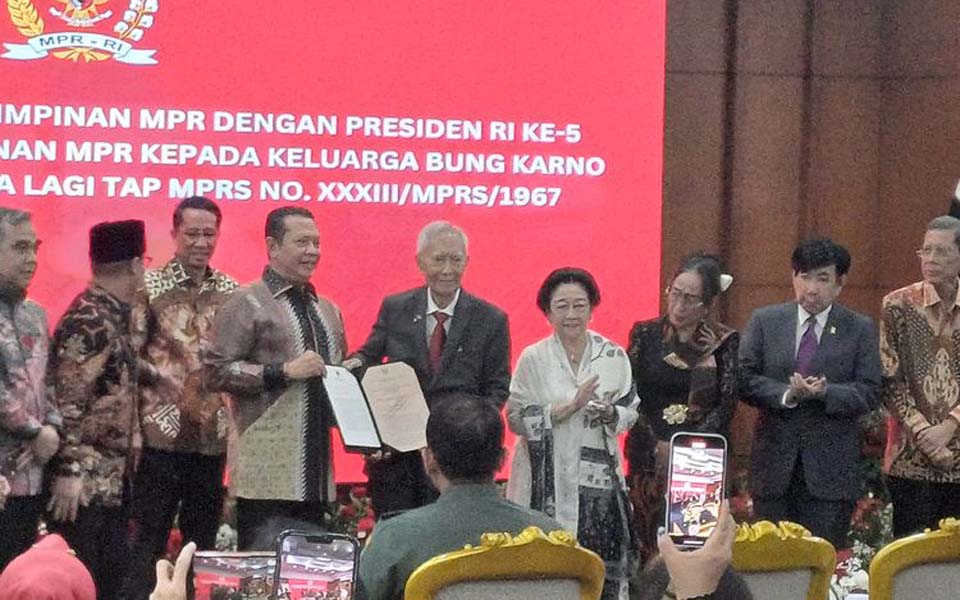M. Rizal Maslan, Jakarta – Cases of human rights violations committed by the Indonesian Communist Party (PKI) in the 1960s are still being neglected. Hundreds of people from anti-communist groups went to the National Human Rights Commission (Komnas HAM) today urging the commission not be used by the PKI, which they said was rising up again1.
The protesters, who came from a number of mass organisations throughout Indonesia arrived in buses and private vehicles at the Komnas HAM offices on Jl. Latuharhary in the Central Jakarta area of Menteng at 10am on Tuesday March 112.
Represented at the protest were members of the Anti-Communist Front (FAKI), Indonesian Islamic Students (PII), the Association of Islamic Students (HMI), the 66 Generation (Angkatan ‘66), the Crush Communism and Liberalism Action Committee (KAGKL), the Lamongan Islamic Community Forum (FUI), the Madura Social Forum (FMM), the Bandung Anti-Communist Front (FAKI Bandung), the East Java Anti-Communist Front (FAKI Jatim) and the East Java Indonesian Ulemas Council (MUI Jatim).
During the action they also brought red-and-white flags, the flags of their respective organisations as well as banners with messages such as, “Don’t use Komnas HAM as a free ride for the PKI’s come back”, “The formation of Komnas HAM was funded from, by and for the people, not for the interests of the PKI” and “Communism on the rise. Get ready! Crush them!”.
The group was prevented form entering the offices by scores of police from the Central Jakarta district police. After conducting a dialogue for several minutes, Komnas HAM finally agreed to meet with 50 representatives.
During the meeting, FAKI Jatim representative Arukat Djaswadi said that up until now Komnas HAM had failed to look into the fact that the PKI slaughtered people and committed human rights violations in East Java.
Djaswadi said he deplored the stand taken by Komnas HAM in deciding to form an ad hoc team to investigate cases of human rights violations in 1965, when the investigation should instead be focused on the PKI.
“So if it’s going to be like this it would be better for Komnas HAM to just be disbanded. Komnas HAM has never looked into the fact that the East Java communities were the victims of the PKI’s ferocity. Many kyai (Islamic clerics) were murdered. Many young people were killed then also”, he said.
Komnas HAM however said it would not be influenced by protests related to the ad hoc team to investigate the 1965-66 massacres. “We will not be influenced and will not enter into a political debate over calls to revoke the Tap MPR3 on communism or not. These [groups] arrival [here] will just be used as input for Komnas HAM to compliment its data”, said Nurkholis, the head of the ad hoc investigation team.
With regard to accusation by the anti-communist community that certain members and the head of Komnas HAM, Ifdhal Kasim, are defenders of communist groups, Nurkholis declined to make any comment. “On this question, hopefully he (Ifdhal Kasim) will make a clarification, we will also take note of this and discuss it later”, he said.
Notes:
1. The protest follows a decision by the National Human Rights Commission on February 27 to set up an ad hoc team (Tim Ad Hoc Kasus Pelanggaran 1965-1966 Komnas HAM) to investigate the 1965-1966 massacre of 1 million or more PKI members and communist sympathisers when then Major General Suharto and the military seized power in 1965. An ad hoc team will also be established to investigate the “mysterious killings” of criminals in the 1980s.
2. According to the New Order dictatorship’s version of history, on March 11, 1966, Indonesia’s founding President Sukarno formally transferred power to Suharto by signing an order known as Supersemar. Sukarno loyalists maintain that the original document was simply an instruction to Suharto to use the armed forces to maintain security and end the massacres.
3. Provisional People’s Consultative Assembly Decree Number XXV/1966 on the Dissolution of the Indonesian Communist Party and Prohibitions on Marxist, Leninist and Communist Teachings.
[Abridged translation by James Balowski from two articles in Detik.com on March 11.]















